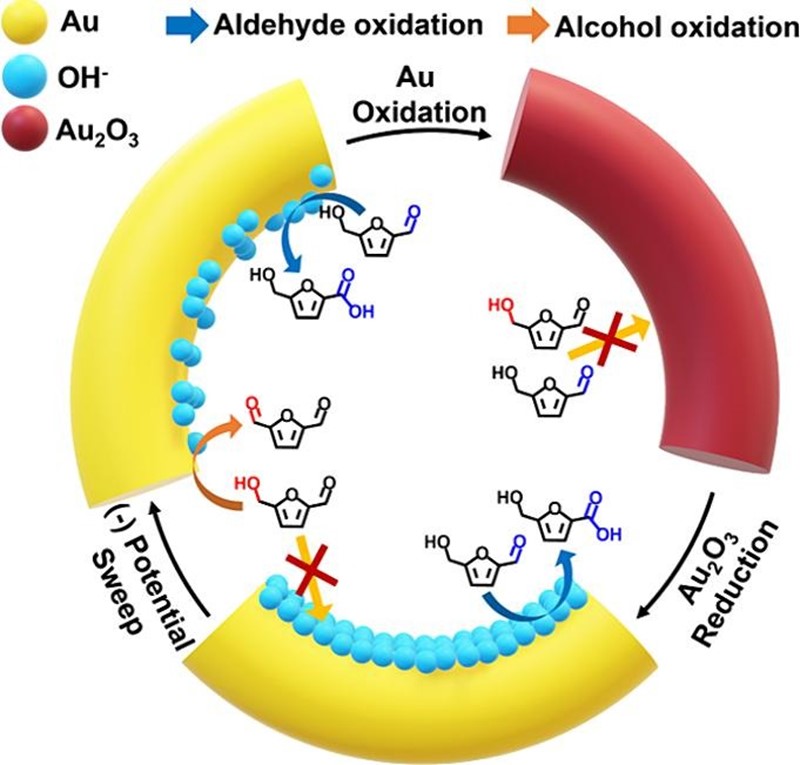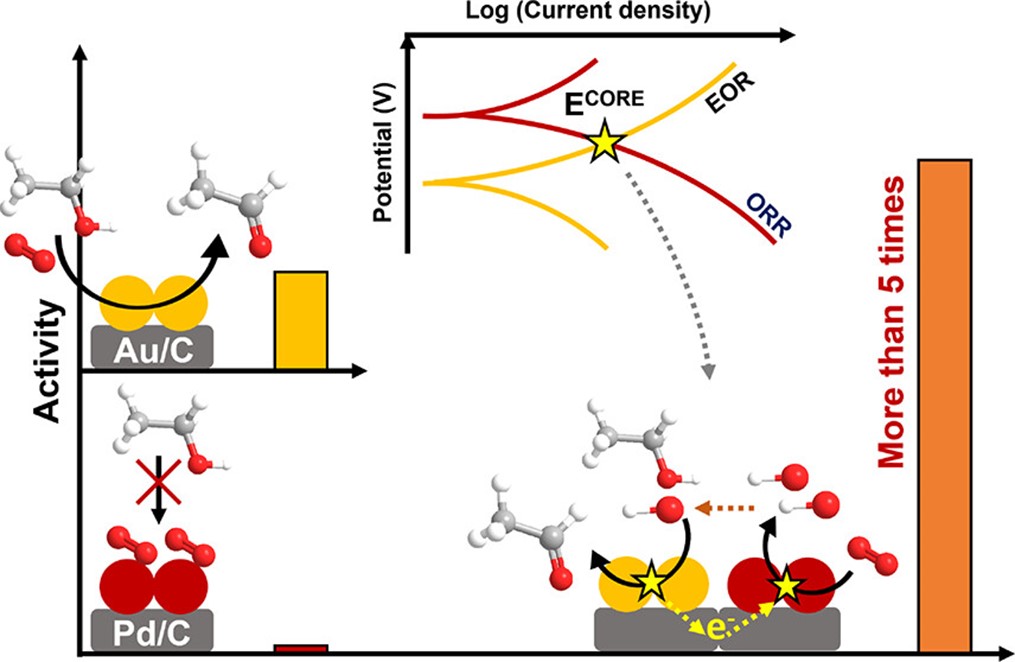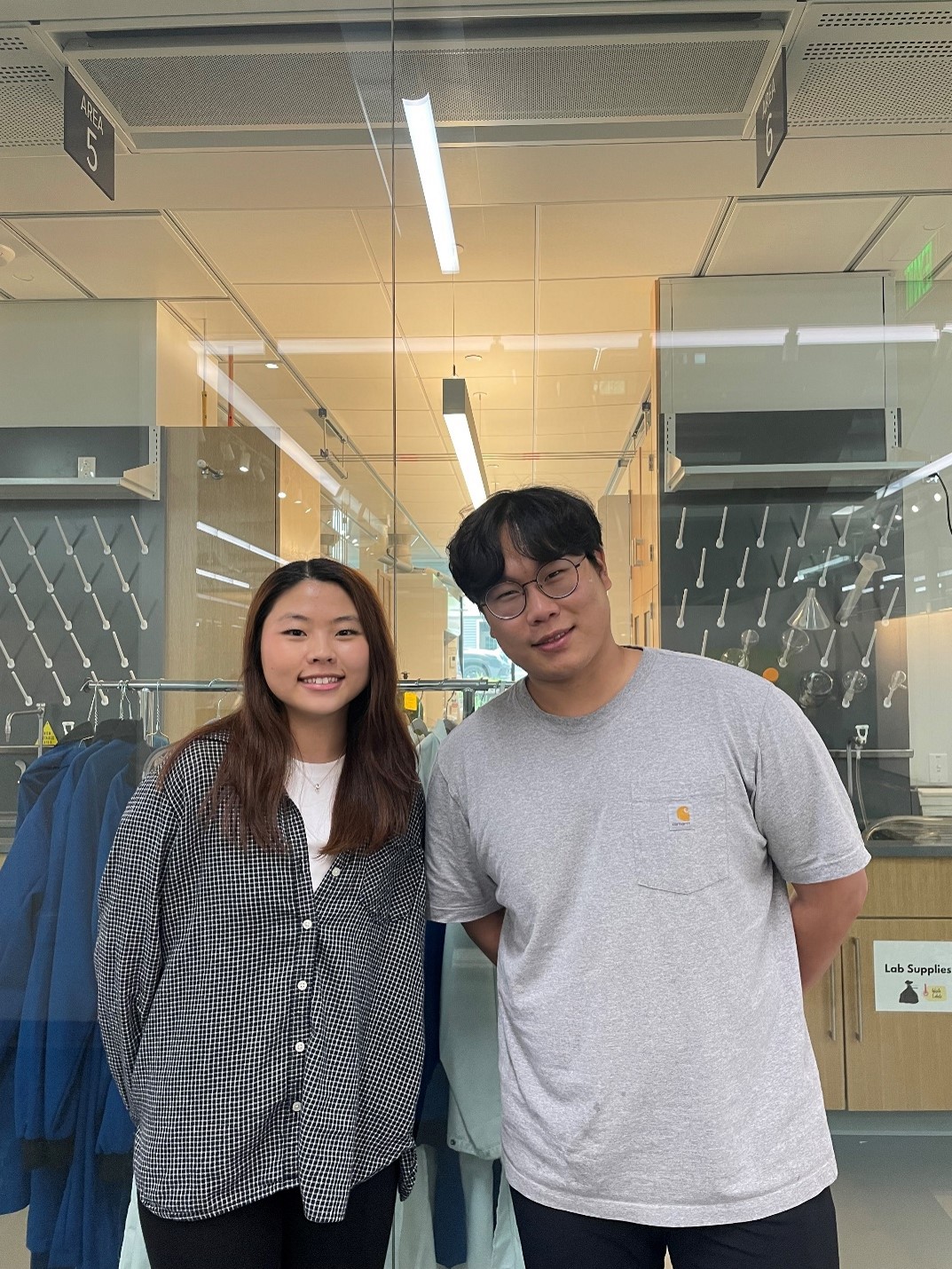The first paper explores new routes to create model catalysts to probe electrocatalytic oxidative dehydrogenation of bio-derived renewable feedstocks for polymer production. Bohyeon developed this new approach with fellow ChBE PhD student Kunli Yang, ChBE undergraduate student Kylie Park (class of 2025), recently graduated MSE graduate student Dr. Joseph Cline, Lehigh IFMD research scientist Dr. Ryan Thorpe, and Prof. Christopher J. Kiely, Harold B. Chambers Senior Professor of Materials Science and Chemical and Biomolecular Engineering at Lehigh, and his advisor Prof. McIntosh. This work appears in the Journal of Catalysis.
The second paper, where Bohyeon pioneered the use of electrochemical Tafel analysis to probe cooperative redox enhancement (CORE) in thermal catalysis, was authored collaboratively with Prof. McIntosh and Drs Isaac Daniel, Mark Douthwaite, and Samuel Pattison in the group of Prof. Graham Hutching, Regus Professor of Chemistry at Cardiff University, UK. Bohyeon recently hosted Dr Daniel on a visit to Lehigh and spent two weeks in Cardiff during Spring 2024. This work appears in the journal ACS Catalysis.
‘Bohyeon is one of the most talented and dedicated graduate students I have had the pleasure to work with over my career’ says McIntosh. ‘He works extremely well in the interdisciplinary research environment provided by the HST building, innovates solutions to complex problems, and leverages techniques and insights from multiple fields to create unique solutions and move our scientific understanding forward.’ Bohyeon has served as the president of the ChBE graduate student association and will receive recognition as a John C. Chen Graduate Fellow in ChBE at Lehigh. This fellowship is provided in memoriam to Prof. John C. Chen. Bohyeon Kim received his B.Eng. and M.Eng. degrees from Gachon University, Seongnam, South Korea in 2019 and 2020, respectively.
Class of 2025 ChBE undergraduate Kylie Park notes "The Clare Boothe Luce Research Scholars Program has significantly enriched my research in electrochemistry and catalysis. Through full-time research over two summers and part-time engagement during the semesters, I've honed my analytical skills, mastered various laboratory techniques, and enhanced my problem-solving abilities. Throughout this period, I developed strong collaborative relationships with my mentors. I am deeply grateful for the financial support from the program and the guidance provided by Prof. McIntosh and Bohyeon. I’ve gained invaluable skills and knowledge through this experience, and I will carry them forward in my chemical engineering career.” Park presented her work at the undergraduate research poster session at the AIChE Annual Meeting in Orlando, Florida, in October 2023 and at the David and Lorraine Freed Undergraduate Research Symposium at Lehigh in April 2024.
 1. Insights Into the Electrochemical Oxidation Selectivity of Hydroxymethylfurfural Over Humin-Layered Au Nanoparticles, Journal of Catalysis, Volume 435, 2024, 115542.
1. Insights Into the Electrochemical Oxidation Selectivity of Hydroxymethylfurfural Over Humin-Layered Au Nanoparticles, Journal of Catalysis, Volume 435, 2024, 115542.
Biomass is a critical renewable resource, and one of its promising derivatives is hydroxymethylfurfural (HMF). HMF can be oxidized to produce valuable chemicals like 2,5-furandicarboxylic acid (FDCA), which has applications in producing sustainable polymers and other materials. Gold (Au) catalysts are particularly effective for the oxidation of HMF to FDCA due to their significantly low onset potential for HMF oxidation compared to other catalysts. However, the mechanistic understanding of HMF oxidation reaction (HMFOR) on Au catalysts remains limited. To address this gap, Bohyeon Kim, working with undergraduate student Kylie Park over the past two years in McIntosh's lab, developed a 3D-printed in-situ Raman cell. The cell allows for understanding favorable HMF oxidation pathways on Au catalysts. Given that HMF contains both aldehyde and alcohol functional groups, this study provides valuable insights that can inform the rational design of Au-based electrocatalysts.
 2. Tafel Analysis Predicts Cooperative Redox Enhancement Effects in Thermocatalytic Alcohol Dehydrogenation ACS Catalysis, 14, 2024 8488–8493
2. Tafel Analysis Predicts Cooperative Redox Enhancement Effects in Thermocatalytic Alcohol Dehydrogenation ACS Catalysis, 14, 2024 8488–8493
The use of electrochemical approaches to interpret thermocatalytic reactions is an expanding field of research. By understanding the electrochemical aspects of thermochemical systems, thermocatalytic activity can be significantly enhanced through innovative catalyst design. However, current electrochemical techniques often fail to accurately reflect catalytic trends, especially when the adsorption of one reactant is a limiting factor.
Bohyeon Kim, working in McIntosh's lab collaboratively with the researchers in Prof Graham Hutchings group at Cardiff University, UK, proposed a novel electrochemical approach that more accurately captures thermocatalytic reactions and the enhancement effects in physically separated bimetallic catalysts. This new method offers a more precise understanding of these reactions, suggesting the way for the development of more effective thermocatalysts.

